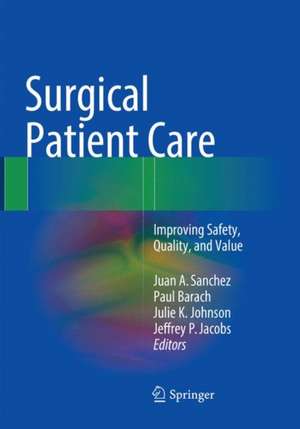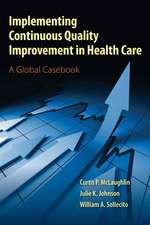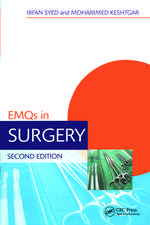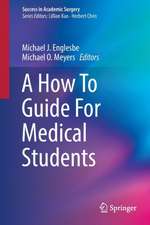Surgical Patient Care: Improving Safety, Quality and Value
Editat de Juan A. Sanchez, Paul Barach, Julie K. Johnson, Jeffrey P. Jacobsen Limba Engleză Paperback – 12 aug 2018
Surgical Patient Care: Improving Safety, Quality and Value targets an international audience which includes all hospital, ambulatory and clinic-based operating room personnel as well as healthcare administrators and managers, directors of risk management and patient safety, health services researchers, and individuals in higher education in the health professions. It is intended to provide both fundamental knowledge and practical information for those at the front line of patient care. The increasing interest in patient safety worldwide makes this a timely global topic. As such, the content is written for an international audience and contains materials from leading international authors who have implemented many successful programs.
| Toate formatele și edițiile | Preț | Express |
|---|---|---|
| Paperback (1) | 1134.07 lei 39-44 zile | |
| Springer International Publishing – 12 aug 2018 | 1134.07 lei 39-44 zile | |
| Hardback (1) | 1611.04 lei 39-44 zile | |
| Springer International Publishing – 8 iun 2017 | 1611.04 lei 39-44 zile |
Preț: 1134.07 lei
Preț vechi: 1193.77 lei
-5% Nou
Puncte Express: 1701
Preț estimativ în valută:
217.02€ • 226.86$ • 183.39£
217.02€ • 226.86$ • 183.39£
Carte tipărită la comandă
Livrare economică 03-08 martie
Preluare comenzi: 021 569.72.76
Specificații
ISBN-13: 9783319829593
ISBN-10: 3319829599
Pagini: 909
Ilustrații: XLVII, 909 p. 169 illus., 156 illus. in color.
Dimensiuni: 178 x 254 mm
Greutate: 2.42 kg
Ediția:Softcover reprint of the original 1st ed. 2017
Editura: Springer International Publishing
Colecția Springer
Locul publicării:Cham, Switzerland
ISBN-10: 3319829599
Pagini: 909
Ilustrații: XLVII, 909 p. 169 illus., 156 illus. in color.
Dimensiuni: 178 x 254 mm
Greutate: 2.42 kg
Ediția:Softcover reprint of the original 1st ed. 2017
Editura: Springer International Publishing
Colecția Springer
Locul publicării:Cham, Switzerland
Cuprins
Surgical Patient Care: Improving Safety, Quality and Value
Editors:
Juan A. Sanchez, MD
Paul Barach, MD
Julie K. Johnson, PhD
Jeffrey P. Jacobs, MD
Table of Contents
Section I. Fundamentals of Systems and Safety Science
Chapter 1 - The Burning Platform: Improving Surgical Quality and Keeping Patients Safe - Juan A. Sanchez and Kevin W. Lobdell
Chapter 2 - Risk factors and epidemiology of Surgical Safety - Oliver Groene
Chapter 3 - Concepts and Models of Safety, Resilience, and Reliability - Jonathan Gao and Sidney Dekker
Chapter 4 - Surgery through a human factors and ergonomics lens - Ken Catchpole
Chapter 5 - The Relationship between Teamwork and Patient Safety - Sallie J. Weaver, Lauren E. Benishek, Ira Leeds and Elizabeth C. Wick
< Chapter 6 - Enterprise and Human Factors Risk Management in Healthcare - James M. Levett, James M. Fasone, Anngail Levick Smith, Stanley S. Labovitz, Jennifer Labovitz, Susan Mellott and Douglas B. Dotan
Chapter 7 - The Patient Experience: an Essential Component of High-Value Care and Service - Sara Shaunfield, Timothy Pearman and Dave Cella
Chapter 8 - Patients and Families as Co-Producers of Safe and Reliable Outcomes - Helen Haskell and Tanya Lord
Chapter 9 - Tools and Strategies for Continuous Quality Improvement and Patient Safety - Julie K. Johnson and Paul Barach
Chapter 10 - New Surgical Technology Implementation and Patient Safety - Chandler D. Wilfong and Steven D. Schwaitzberg
Section II - Job and Organizational Design
Chapter 11 - Organizational Learning and Cultural Determinants of Safety - Kathleen M. Sutcliffe
Chapter 12 - The role of architecture and physical environment in Hospital Safety Design - Charles D. Cadenhead, Laurie Waggener and Bhargav Goswami
Chapter 13 - Building Surgical Expertise through the Science of Continuous Learning and Training - Peter Hani Cosman, Pramudith Sirimanna and Paul Barach
Chapter 14 - Promoting Occupational Wellness and Combating Professional Burnout in the Surgical Workforce - Ross M. Ungerleider, Jamie Dickey Ungerleider and Graham D. Ungerleider
Chapter 15 - Executive Leadership and Surgical Quality: A Guide for Senior Hospital Leaders - Susan Moffatt-Bruce and Robert Higgins
Chapter 16 - Information Technology Infrastructure, Management and Implementation: The Rise of the Emergent Clinical Information System and the Chief Medical Information Officer - Jon David Patrick, Paul Barach and Ali Besiso
Chapter 17 - Redesigning Hospital Alarms for Reliable and Safe Care - Paul Barach and Juan A. Sanchez
Chapter 18 - Implementation Science: Translating Research into Practice for Sustained Impact - Gregory A. Aarons, Marisa Sklar and Nick Sevdalis
Section III - Perioperative Quality and Patient Safety
Chapter 19 - The Leadership Role: Designing Perioperative Surgical Services for Safety and Efficiency - Victoria M. Steelman and Martha D. Stratton
<
Chapter 20 - Operating Room Management, Measures of OR Efficiency and Cost Effectiveness - Sanjana Vig, Bassam Kadry and Alex Macario
Chapter 21 - The Science of Delivering Safe and Reliable Anesthesia Care - Maurice F. Joyce, Holly E. Careskey, Paul Barach and Ruben J. Azocar
Chapter 22 - Enhanced Recovery After Surgery: ERAS - Jonas Nygren, Olle Ljungqvist and Anders Thorell
< Chapter 23 - The Next Frontier: Ambulatory and Outpatient Surgical Safety and Quality - Beverly A. Kirchner
Chapter 24 - Human Factors and Operating Room Design Challenges - Dirk de Korne, Loh Huey Peng and Shanqing Yin
Chapter 25 - Diagnostic Error in Surgery and Surgical Services - Mark L. Graber, Juan A. Sanchez and Paul Barach
Chapter 26 - Preventing Perioperative ‘Never Events’ - Patricia C. Seifert, Paula Graling and Juan A. Sanchez
Chapter 27 - Health Care Associated Infections in Surgical Practice - Scott J. Ellner and Affan Umer
Chapter 28 - Safer Medication Administration Through Design and Ergonomics - Sheldon S. Sones and Paul Barach
Chapter 29 - Preventing Venous Thromboembolism Across the Surgical Care Continuum - Lisa M. Kodadek and Elliott R. Haut
Chapter 30 - Preventing Perioperative Positioning and Equipment Injuries - Lisa Spruce
Chapter 31 - Challenges in Preventing Electrical, Thermal, and Radiation Injuries - Mark E. Bruley
Chapter 32 - Improving Clinical Performance by Analyzing surgical skills and operative errors - Katherine E. Law, Anne-Lise D. D’Angelo, Elaine R. Cohen and Carla M. Pugh
Section IV - Approaches to Managing Risks
Chapter 33 - Perioperative Risk and Management of Surgical patients - James M. Levett, Susan Mellott, Anngail Levick Smith, James M. Fasone, Stanley S. Labovitz, Jennifer Labovitz and Douglas B. Dotan
Chapter 34 - Managing the Complex High-Risk Surgical Patient - Kevin W. Lobdell, B. Todd Heniford and Juan A. Sanchez
Chapter 35 - Geriatric Surgical Quality and Wellness - Daniel J. Gallante, JoAnn Coleman and Mark R. Katlic
Chapter 36 - Patient Transitions and Handovers across the Continuum of Surgical Care - Donna M. Woods and Lisa M. McElroy
Chapter 37 - Failure to Rescue and Failure to Perceive Patients in Crisis - Christian Peter Subbe and Paul Barach
Chapter 38 - A Quiet Revolution: Communicating and disclosing about unexpected outcomes and Resolving Patient Harm - William M. Sage, Madelene J. Ottosen and Ben Coopwood
Chapter 39 - It’s My Fault: Personal Accountability & the Role of the Risk Manager in Creating Patient Safety - Elizabeth A. Duthie
Chapter 40 - Capturing, Reporting and Learning from Adverse Events - Juan A. Sanchez and Paul Barach
Chapter 41 - How not to run an incident investigation - Bryce R. Cassin and Paul Barach
Chapter 42 - Multi-institutional Learning and Collaboration to Improve Quality and Safety - Julie K. Johnson, Christina A. Minami, Allison R. Dahlke and Karl Y. Bilimoria
Chapter 43 - Lessons Learned from Anesthesia Registries About Surgical Safety and Reliability - Richard P. Dutton
Chapter 44 - Use of Surgical Registry Data to Improve Outcomes - Jeffrey P. Jacobs
Section V - Regulation, Policy, and the Future of Surgical Care
Chapter 45 - How regulators assess safety and quality in surgical services - Stephen Leyshon, Tita Listyowardojo Bach, Eva Turk, Aileen Orr, Bobbie N. Ray-Sannerud and Paul Barach
Chapter 46 - The Perioperative Surgical Home: The New Frontier - Juhan Paiste, Daniel I. Chu and Thomas R. Vetter
Chapter 47 - Surgical Medical Education Program Accreditation and the Clinical Learning Environment: Patient Safety and Healthcare Quality - John R. Potts, III, Constance K. Haan and Kevin B. Weiss
Chapter 48 - Affordable Care Act, Public Legislation and Professional Self-Regulation: Implications for Public Policy - Stephen J. Lahey
Chapter 49 - Maintaining Surgical Safety and Quality in Rural and Remote Settings - Amy L. Halverson and Julie K. Johnson
Chapter 50 - Global Surgery: Progress and challenges in Surgical Quality and Patient Safety - Christopher Pettengell, Stephen Williams and Ara Darzi
Chapter 51 - International Perspectives on Safety, Quality and Reliability of Surgical Care - Sertaç Çiçek and Hişam Alahdab
Chapter 52 - Surgical Safety in Developing Countries: Middle East, North Africa and Gulf Countries - Abdulelah Alhawsawi and Paul Barach
Chapter 53 - Future Directions of Surgical Safety - Timothy D. Browder and Paul M. Maggio
Editors:
Juan A. Sanchez, MD
Paul Barach, MD
Julie K. Johnson, PhD
Jeffrey P. Jacobs, MD
Table of Contents
Section I. Fundamentals of Systems and Safety Science
Chapter 1 - The Burning Platform: Improving Surgical Quality and Keeping Patients Safe - Juan A. Sanchez and Kevin W. Lobdell
Chapter 2 - Risk factors and epidemiology of Surgical Safety - Oliver Groene
Chapter 3 - Concepts and Models of Safety, Resilience, and Reliability - Jonathan Gao and Sidney Dekker
Chapter 4 - Surgery through a human factors and ergonomics lens - Ken Catchpole
Chapter 5 - The Relationship between Teamwork and Patient Safety - Sallie J. Weaver, Lauren E. Benishek, Ira Leeds and Elizabeth C. Wick
< Chapter 6 - Enterprise and Human Factors Risk Management in Healthcare - James M. Levett, James M. Fasone, Anngail Levick Smith, Stanley S. Labovitz, Jennifer Labovitz, Susan Mellott and Douglas B. Dotan
Chapter 7 - The Patient Experience: an Essential Component of High-Value Care and Service - Sara Shaunfield, Timothy Pearman and Dave Cella
Chapter 8 - Patients and Families as Co-Producers of Safe and Reliable Outcomes - Helen Haskell and Tanya Lord
Chapter 9 - Tools and Strategies for Continuous Quality Improvement and Patient Safety - Julie K. Johnson and Paul Barach
Chapter 10 - New Surgical Technology Implementation and Patient Safety - Chandler D. Wilfong and Steven D. Schwaitzberg
Section II - Job and Organizational Design
Chapter 11 - Organizational Learning and Cultural Determinants of Safety - Kathleen M. Sutcliffe
Chapter 12 - The role of architecture and physical environment in Hospital Safety Design - Charles D. Cadenhead, Laurie Waggener and Bhargav Goswami
Chapter 13 - Building Surgical Expertise through the Science of Continuous Learning and Training - Peter Hani Cosman, Pramudith Sirimanna and Paul Barach
Chapter 14 - Promoting Occupational Wellness and Combating Professional Burnout in the Surgical Workforce - Ross M. Ungerleider, Jamie Dickey Ungerleider and Graham D. Ungerleider
Chapter 15 - Executive Leadership and Surgical Quality: A Guide for Senior Hospital Leaders - Susan Moffatt-Bruce and Robert Higgins
Chapter 16 - Information Technology Infrastructure, Management and Implementation: The Rise of the Emergent Clinical Information System and the Chief Medical Information Officer - Jon David Patrick, Paul Barach and Ali Besiso
Chapter 17 - Redesigning Hospital Alarms for Reliable and Safe Care - Paul Barach and Juan A. Sanchez
Chapter 18 - Implementation Science: Translating Research into Practice for Sustained Impact - Gregory A. Aarons, Marisa Sklar and Nick Sevdalis
Section III - Perioperative Quality and Patient Safety
Chapter 19 - The Leadership Role: Designing Perioperative Surgical Services for Safety and Efficiency - Victoria M. Steelman and Martha D. Stratton
<
Chapter 20 - Operating Room Management, Measures of OR Efficiency and Cost Effectiveness - Sanjana Vig, Bassam Kadry and Alex Macario
Chapter 21 - The Science of Delivering Safe and Reliable Anesthesia Care - Maurice F. Joyce, Holly E. Careskey, Paul Barach and Ruben J. Azocar
Chapter 22 - Enhanced Recovery After Surgery: ERAS - Jonas Nygren, Olle Ljungqvist and Anders Thorell
< Chapter 23 - The Next Frontier: Ambulatory and Outpatient Surgical Safety and Quality - Beverly A. Kirchner
Chapter 24 - Human Factors and Operating Room Design Challenges - Dirk de Korne, Loh Huey Peng and Shanqing Yin
Chapter 25 - Diagnostic Error in Surgery and Surgical Services - Mark L. Graber, Juan A. Sanchez and Paul Barach
Chapter 26 - Preventing Perioperative ‘Never Events’ - Patricia C. Seifert, Paula Graling and Juan A. Sanchez
Chapter 27 - Health Care Associated Infections in Surgical Practice - Scott J. Ellner and Affan Umer
Chapter 28 - Safer Medication Administration Through Design and Ergonomics - Sheldon S. Sones and Paul Barach
Chapter 29 - Preventing Venous Thromboembolism Across the Surgical Care Continuum - Lisa M. Kodadek and Elliott R. Haut
Chapter 30 - Preventing Perioperative Positioning and Equipment Injuries - Lisa Spruce
Chapter 31 - Challenges in Preventing Electrical, Thermal, and Radiation Injuries - Mark E. Bruley
Chapter 32 - Improving Clinical Performance by Analyzing surgical skills and operative errors - Katherine E. Law, Anne-Lise D. D’Angelo, Elaine R. Cohen and Carla M. Pugh
Section IV - Approaches to Managing Risks
Chapter 33 - Perioperative Risk and Management of Surgical patients - James M. Levett, Susan Mellott, Anngail Levick Smith, James M. Fasone, Stanley S. Labovitz, Jennifer Labovitz and Douglas B. Dotan
Chapter 34 - Managing the Complex High-Risk Surgical Patient - Kevin W. Lobdell, B. Todd Heniford and Juan A. Sanchez
Chapter 35 - Geriatric Surgical Quality and Wellness - Daniel J. Gallante, JoAnn Coleman and Mark R. Katlic
Chapter 36 - Patient Transitions and Handovers across the Continuum of Surgical Care - Donna M. Woods and Lisa M. McElroy
Chapter 37 - Failure to Rescue and Failure to Perceive Patients in Crisis - Christian Peter Subbe and Paul Barach
Chapter 38 - A Quiet Revolution: Communicating and disclosing about unexpected outcomes and Resolving Patient Harm - William M. Sage, Madelene J. Ottosen and Ben Coopwood
Chapter 39 - It’s My Fault: Personal Accountability & the Role of the Risk Manager in Creating Patient Safety - Elizabeth A. Duthie
Chapter 40 - Capturing, Reporting and Learning from Adverse Events - Juan A. Sanchez and Paul Barach
Chapter 41 - How not to run an incident investigation - Bryce R. Cassin and Paul Barach
Chapter 42 - Multi-institutional Learning and Collaboration to Improve Quality and Safety - Julie K. Johnson, Christina A. Minami, Allison R. Dahlke and Karl Y. Bilimoria
Chapter 43 - Lessons Learned from Anesthesia Registries About Surgical Safety and Reliability - Richard P. Dutton
Chapter 44 - Use of Surgical Registry Data to Improve Outcomes - Jeffrey P. Jacobs
Section V - Regulation, Policy, and the Future of Surgical Care
Chapter 45 - How regulators assess safety and quality in surgical services - Stephen Leyshon, Tita Listyowardojo Bach, Eva Turk, Aileen Orr, Bobbie N. Ray-Sannerud and Paul Barach
Chapter 46 - The Perioperative Surgical Home: The New Frontier - Juhan Paiste, Daniel I. Chu and Thomas R. Vetter
Chapter 47 - Surgical Medical Education Program Accreditation and the Clinical Learning Environment: Patient Safety and Healthcare Quality - John R. Potts, III, Constance K. Haan and Kevin B. Weiss
Chapter 48 - Affordable Care Act, Public Legislation and Professional Self-Regulation: Implications for Public Policy - Stephen J. Lahey
Chapter 49 - Maintaining Surgical Safety and Quality in Rural and Remote Settings - Amy L. Halverson and Julie K. Johnson
Chapter 50 - Global Surgery: Progress and challenges in Surgical Quality and Patient Safety - Christopher Pettengell, Stephen Williams and Ara Darzi
Chapter 51 - International Perspectives on Safety, Quality and Reliability of Surgical Care - Sertaç Çiçek and Hişam Alahdab
Chapter 52 - Surgical Safety in Developing Countries: Middle East, North Africa and Gulf Countries - Abdulelah Alhawsawi and Paul Barach
Chapter 53 - Future Directions of Surgical Safety - Timothy D. Browder and Paul M. Maggio
Notă biografică
Juan A. Sanchez, MD, MPA
Associate Professor of Surgery
Johns Hopkins University School of Medicine
Chair of Surgery, Saint Agnes Hospital
900 Caton Avenue
Baltimore, MD
USA
Paul Barach, BSc, MD, MPH
Clinical Professor
Children’s Hospital of Michigan
Wayne State University School of Medicine
Detroit, MI USA
Julie K. Johnson, MSPH, PhD
Professor
Northwestern University
Department of Surgery
Chicago, IL
USA
Professor of Surgery, Johns Hopkins University
Director, Andrews/Daicoff Cardiovascular Program
Surgical Director of Heart Transplantation and Extracorporeal Life Support Programs
Johns Hopkins All Children’s Heart Institute
All Children’s Hospital
Saint Petersburg, FL
USA
Textul de pe ultima copertă
This book focuses exclusively on the surgical patient and on the perioperative environment with its unique socio-technical and cultural issues. It covers preoperative, intraoperative, and postoperative processes and decision making and explores both sharp-end and latent factors contributing to harm and poor quality outcomes. It is intended to be a resource for all healthcare practitioners that interact with the surgical patient. The first section presents foundational principles of safety science and related social science. The second exposes barriers to achieving optimal surgical outcomes and details the various errors and events that occur in the perioperative environment. The third section contains prescriptive and proactive tools and ways to eliminate errors and harm. The final section focuses on developing continuous quality improvement programs with an emphasis on safety and reliability.
Surgical Patient Care: Improving Safety, Quality and Value targets an international audience which includes all hospital, ambulatory and clinic-based operating room personnel as well as healthcare administrators and managers, directors of risk management and patient safety, health services researchers, and individuals in higher education in the health professions.
Surgical Patient Care: Improving Safety, Quality and Value targets an international audience which includes all hospital, ambulatory and clinic-based operating room personnel as well as healthcare administrators and managers, directors of risk management and patient safety, health services researchers, and individuals in higher education in the health professions.
Caracteristici
Showcases perioperative patient safety for a wide audience
Written by leading international authors who have implemented many successful programs
Allows the reader to understand the unique nature of the surgical environment
Includes supplementary material: sn.pub/extras
Written by leading international authors who have implemented many successful programs
Allows the reader to understand the unique nature of the surgical environment
Includes supplementary material: sn.pub/extras

















